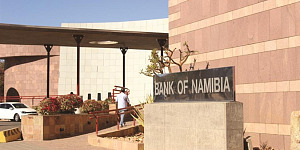
Government has secured N$850 million to help fund its budget deficit by listing a debut bond on the Johannesburg Stock Exchange (JSE), redeemable in South African rand (ZAR) in ten years’ time.
Deputy Finance Minister Calle Schlettwein yesterday afternoon said the bond, priced at 8,26%, formed part of Government’s strategy to raise N$3 billion on the JSE to help fund the Medium Term Expenditure Framework (MTEF) for 2012-15. Although the N$850 million secured through Wednesday’s listing wasn’t targeted for specific expenditure, Schlettwein stressed that it would be geared towards budgeted expenses.
Namibia’s estimated budget deficit for 2012-13, according to the current MTEF, will be nearly N$4,8 billion – or 4,4% of its gross domestic product (GDP).
Government decided on the ZAR 3 billion Medium Term Note (MTN) Programme on the JSE, as it is known, because it doesn’t carry a currency risk. As the Namibia dollar is pegged to the South African rand, the amount Government has to repay will not be influenced by an exchange rate.
This is not the case with other foreign loans, such as Namibia’s award-winning ten-year Eurobond. Government last year raised US$500 million (about N$3,9 billion) by issuing its debut Eurobond. This, however, could cost the country dearly in redeeming the original amount and the interest due on it, should the Namibia dollar depreciate significantly against the US dollar.
Finance Minister Saara Kuugongelwa-Amadhila is acutely aware of this risk, which is why she recently sought Cabinet approval to establish a sinking fund to mitigate possible risks stemming from the Eurobond.
In layman’s terms, a sinking fund is a fund into which Government would regularly put money to ensure that it can redeem the Eurobond when it has to without causing budget cash-flow problems.
Schlettwein yesterday confirmed that Cabinet has given the go-ahead on the sinking fund and that the Ministry of Finance is working with the Bank of Namibia (BoN) on establishing it. “It is the cheapest way,” he said.
The Namibian has it on good authority that Government will have to pump about N$115 million into the sinking fund every quarter to make sure that it has enough money to redeem the Eurobond when it matures.
The International Monetary Fund (IMF) last week said keeping Namibia’s debt sustainable would require “strict adherence” to Government’s “medium-term fiscal plan aimed at delivering fiscal surpluses by 2014-15”.
The issuance of the Eurobond, mainly to fund Government’s Targeted Intervention Programme for Employment and Economic Growth (Tipeeg), has pushed Namibia’s external debt up to 8,1% of GDP – above Government’s ceiling of 5%.
To limit foreign currency risk, Government also has a limit that its foreign debt may not exceed 20% of its overall debt. The Eurobond has pushed Government’s total foreign debt up to 28% of overall debt.



































